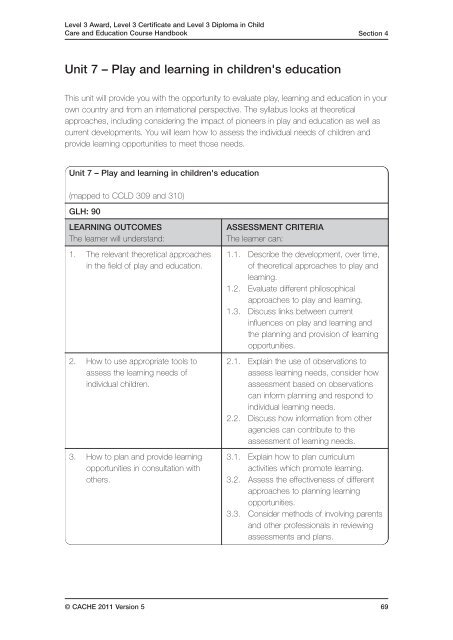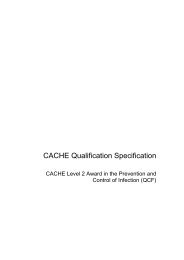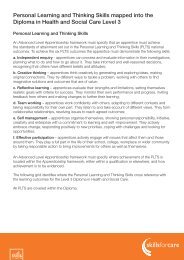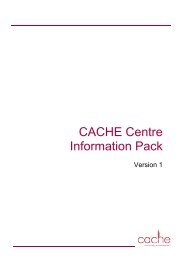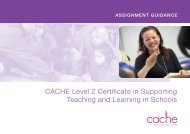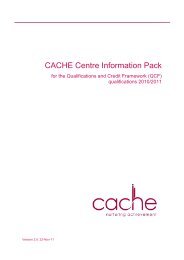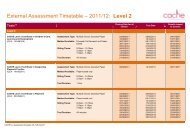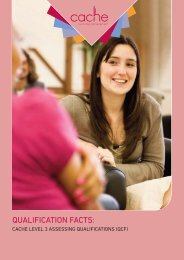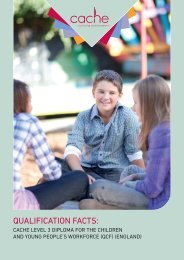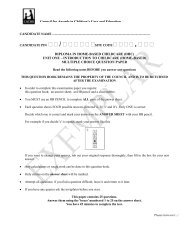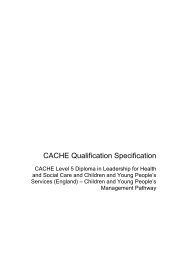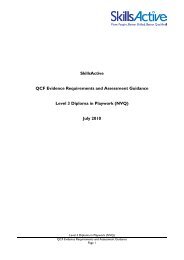- Page 1 and 2:
CANDIDATE HANDBOOK CACHE Level 3 Aw
- Page 3 and 4:
© CACHE 2011 Except as allowed by
- Page 5 and 6:
Contents ii Level 3 Award, Level 3
- Page 7 and 8:
Contents iv Level 3 Award, Level 3
- Page 9 and 10:
Candidate information vi Level 3 Aw
- Page 11 and 12:
About this handbook viii Level 3 Aw
- Page 13 and 14:
Introduction Attendance at classes
- Page 15 and 16:
Introduction xii Level 3 Award, Lev
- Page 17 and 18:
Section 1 2 Level 3 Award, Level 3
- Page 19 and 20:
Section 1 Types of assessment Award
- Page 21 and 22:
Section 1 Re-mark request for short
- Page 23 and 24:
Section 1 8 Level 3 Award, Level 3
- Page 25 and 26:
Section 2 10 Level 3 Award, Level 3
- Page 27 and 28:
Section 2 Unit titles 12 Level 3 Aw
- Page 29 and 30:
Section 3 14 Level 3 Award, Level 3
- Page 31 and 32:
Section 3 16 Level 3 Award, Level 3
- Page 33 and 34: Section 4 18 Level 3 Award, Level 3
- Page 35 and 36: Section 4 20 Level 3 Award, Level 3
- Page 37 and 38: Section 4 22 Level 3 Award, Level 3
- Page 39 and 40: Section 4 24 Level 3 Award, Level 3
- Page 41 and 42: Section 4 26 Level 3 Award, Level 3
- Page 43 and 44: Section 4 28 Level 3 Award, Level 3
- Page 45 and 46: Section 4 30 Level 3 Award, Level 3
- Page 47 and 48: Section 4 32 Level 3 Award, Level 3
- Page 49 and 50: Section 4 34 Level 3 Award, Level 3
- Page 51 and 52: Section 4 36 Level 3 Award, Level 3
- Page 53 and 54: Section 4 38 Level 3 Award, Level 3
- Page 55 and 56: Section 4 Unit 3 - Supporting child
- Page 57 and 58: Section 4 The characteristics of di
- Page 59 and 60: Section 4 Unit 3 - Supporting child
- Page 61 and 62: Section 4 46 Level 3 Award, Level 3
- Page 63 and 64: Section 4 Unit 4 - Keeping children
- Page 65 and 66: Section 4 50 Level 3 Award, Level 3
- Page 67 and 68: Section 4 52 Level 3 Award, Level 3
- Page 69 and 70: Section 4 54 Level 3 Award, Level 3
- Page 71 and 72: Section 4 56 Level 3 Award, Level 3
- Page 73 and 74: Section 4 4. Recent initiatives and
- Page 75 and 76: Section 4 60 Level 3 Award, Level 3
- Page 77 and 78: Section 4 62 Level 3 Award, Level 3
- Page 79 and 80: Section 4 64 Level 3 Award, Level 3
- Page 81 and 82: Section 4 66 Level 3 Award, Level 3
- Page 83: Section 4 68 Level 3 Award, Level 3
- Page 87 and 88: Section 4 72 Level 3 Award, Level 3
- Page 89 and 90: Section 4 74 Level 3 Award, Level 3
- Page 91 and 92: Section 4 76 Level 3 Award, Level 3
- Page 93 and 94: Section 4 Unit 8 - Caring for child
- Page 95 and 96: Section 4 Unit 8 - Caring for child
- Page 97 and 98: Section 4 82 Level 3 Award, Level 3
- Page 99 and 100: Section 4 84 Level 3 Award, Level 3
- Page 101 and 102: Section 4 How to respond to behavio
- Page 103 and 104: Section 4 3. Practice Evidence Reco
- Page 105 and 106: Section 4 90 Level 3 Award, Level 3
- Page 107 and 108: Section 4 Assignment planner 232 Ca
- Page 109 and 110: Section 4 Candidates must achieve b
- Page 111 and 112: Section 5 236 Level 3 Award, Level
- Page 113 and 114: Section 5 238 Level 3 Award, Level
- Page 115 and 116: Section 6 240 Level 3 Award, Level
- Page 117 and 118: Mapping of the CACHE Level 3 Award,
- Page 119 and 120: Mapping of the CACHE Level 3 Award,
- Page 121 and 122: Section 7 246 Level 3 Award, Level
- Page 123 and 124: Section 7 Unit 1 2 3 4 5 6 7 8 9 10
- Page 125 and 126: Section 7 250 Level 3 Award, Level
- Page 127 and 128: Section 8 252 Level 3 Award, Level
- Page 129 and 130: To achieve 0 - 3 marks To achieve 4
- Page 131 and 132: Section 8 256 Level 3 Award, Level
- Page 133 and 134: Section 8 258 Level 3 Award, Level
- Page 135 and 136:
Section 8 Candidate Compensatory ma
- Page 137 and 138:
Section 8 262 Level 3 Award, Level
- Page 139 and 140:
Section 8 264 Level 3 Award, Level
- Page 141 and 142:
Section 8 Candidate Compensatory ma
- Page 143 and 144:
Section 8 268 Level 3 Award, Level
- Page 145 and 146:
Section 8 270 Level 3 Award, Level
- Page 147 and 148:
Candidate Section 8 Compensatory ma
- Page 149 and 150:
Section 8 274 Level 3 Award, Level
- Page 151 and 152:
Section 8 276 Level 3 Award, Level
- Page 153 and 154:
Section 8 Candidate Compensatory ma
- Page 155 and 156:
Section 8 280 Level 3 Award, Level
- Page 157 and 158:
Section 8 282 Level 3 Award, Level
- Page 159 and 160:
Compensatory marking grid Section 8
- Page 161 and 162:
Section 8 286 Level 3 Award, Level
- Page 163 and 164:
Section 8 288 Level 3 Award, Level
- Page 165 and 166:
Candidate Compensatory marking grid
- Page 167 and 168:
Section 8 292 Level 3 Award, Level
- Page 169 and 170:
Candidate Section 8 Name: Compensat
- Page 171 and 172:
Section 8 296 Level 3 Award, Level
- Page 173 and 174:
Section 8 298 Level 3 Award, Level
- Page 175 and 176:
Section 8 Candidate 300 Name: Compe
- Page 177 and 178:
Section 8 302 Level 3 Award, Level
- Page 179 and 180:
Section 9 304 Level 3 Award, Level
- Page 181 and 182:
Section 9 306 Level 3 Award, Level
- Page 183 and 184:
Section 9 308 Level 3 Award, Level
- Page 185 and 186:
Placement Summary Candidate Section
- Page 187 and 188:
Section 9 312 Level 3 Award, Level
- Page 189 and 190:
Section 9 Unit 2 Practice Evidence
- Page 191 and 192:
Unit 2 Practice Evidence Record - D
- Page 193 and 194:
Section 9 Unit 2 Practice Evidence
- Page 195 and 196:
Section 9 Unit 2 Practice Evidence
- Page 197 and 198:
Section 9 322 Level 3 Award, Level
- Page 199 and 200:
Section 9 Unit 4 Practice Evidence
- Page 201 and 202:
Section 9 Unit 4 Practice Evidence
- Page 203 and 204:
Section 9 328 Level 3 Award, Level
- Page 205 and 206:
Unit 5 Practice Evidence Record - T
- Page 207 and 208:
Section 9 332 Level 3 Award, Level
- Page 209 and 210:
Section 9 334 Level 3 Award, Level
- Page 211 and 212:
Section 9 Unit 7 Practice Evidence
- Page 213 and 214:
Section 9 Unit 7 Practice Evidence
- Page 215 and 216:
Section 9 Unit 7 Practice Evidence
- Page 217 and 218:
Section 9 Unit 7 Practice Evidence
- Page 219 and 220:
Section 9 344 Level 3 Award, Level
- Page 221 and 222:
Section 9 346 Level 3 Award, Level
- Page 223 and 224:
Section 9 348 Level 3 Award, Level
- Page 225 and 226:
Section 9 350 Level 3 Award, Level
- Page 227 and 228:
Section 9 352 Level 3 Award, Level
- Page 229 and 230:
Section 9 354 Level 3 Award, Level
- Page 231 and 232:
Section 9 356 Level 3 Award, Level
- Page 233 and 234:
Section 9 358 Level 3 Award, Level
- Page 235 and 236:
Section 9 360 Level 3 Award, Level
- Page 237 and 238:
Section 9 362 Level 3 Award, Level
- Page 239 and 240:
Section 9 364 Level 3 Award, Level
- Page 241 and 242:
Section 9 366 Level 3 Award, Level
- Page 243 and 244:
Section 9 368 Level 3 Award, Level
- Page 245 and 246:
Section 9 370 Level 3 Award, Level
- Page 247 and 248:
Section 9 372 Level 3 Award, Level
- Page 249 and 250:
Section 9 374 Level 3 Award, Level
- Page 251 and 252:
Section 9 376 Level 3 Award, Level
- Page 253 and 254:
Section 9 378 Level 3 Award, Level
- Page 255 and 256:
Section 9 380 Level 3 Award, Level
- Page 257 and 258:
Section 9 382 Level 3 Award, Level
- Page 259 and 260:
Section 9 384 Level 3 Award, Level
- Page 261 and 262:
Section 9 386 Level 3 Award, Level
- Page 263 and 264:
Section 9 388 Level 3 Award, Level
- Page 265 and 266:
Section 9 390 Level 3 Award, Level
- Page 267 and 268:
Section 9 392 Level 3 Award, Level
- Page 269 and 270:
Section 9 394 Level 3 Award, Level
- Page 271 and 272:
Section 9 396 Level 3 Award, Level
- Page 273 and 274:
Section 9 398 Level 3 Award, Level
- Page 275 and 276:
Section 9 400 Level 3 Award, Level
- Page 277 and 278:
Section 9 402 Level 3 Award, Level
- Page 279 and 280:
Section 9 404 Level 3 Award, Level
- Page 281 and 282:
Section 9 406 Level 3 Award, Level
- Page 283 and 284:
Section 9 408 Level 3 Award, Level
- Page 285 and 286:
Section 9 410 Level 3 Award, Level
- Page 287 and 288:
Section 9 412 Level 3 Award, Level
- Page 289 and 290:
Handbook feedback form 414 Level 3


